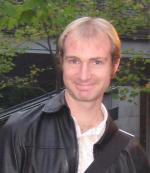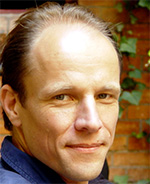Campus News
Gifts from alum Sage Weil provide $3 million for open source research at UC Santa Cruz
Alumnus Sage Weil has established an endowed chair and provided an additional $2 million for research in open source software.


UC Santa Cruz alumnus Sage Weil, who developed his computer science Ph.D. thesis project into a highly successful open-source software product (the data storage system Ceph), has made major gifts to UC Santa Cruz providing a total of $3 million to support research in open-source software.
A $500,000 gift, plus matching funds from the UC Presidential Match for Endowed Chairs, will establish a $1 million endowment at UC Santa Cruz for the Sage Weil Presidential Chair for Open Source Software. Additional gifts totaling $2 million will support research in open-source software led by professor of computer science Carlos Maltzahn, who directs the Center for Research in Open Source Software (CROSS) at UC Santa Cruz.
The purpose of CROSS, Maltzahn said, is to enable more UC Santa Cruz students to do what Weil did and develop their graduate thesis projects or undergraduate senior projects into successful open-source software projects with vibrant user and developer communities.
“CROSS is bridging the gap between student research and open-source software projects,” Maltzahn said. “A lot of students build a significant amount of software infrastructure during their thesis research, and these contributions are often lost because there are no resources for students to continue working on their projects after they graduate. The Sage Weil funds allow us to now incubate the most promising prototypes so that all these great student research projects don’t get thrown away.”
Maltzahn and Scott Brandt, professor of computer science and now vice chancellor for research at UC Santa Cruz, supervised Weil’s thesis research. According to Brandt, Weil’s experience with Ceph was the inspiration for establishing CROSS.
“Sage did something really pretty extraordinary, and this is a wonderful way for him to help other students potentially achieve what he did,” Brandt said. “He kept working on Ceph for seven years after he earned his Ph.D. to take it from a prototype to a usable product. Although CROSS can’t fund people for seven years, we hope to enable students to develop things to the point where other people can carry it forward.”
Data science, storage, networking
CROSS will support the formation of open source projects, build communities around them, and help with achieving production-level code releases. It will have an Industrial Advisory Board to provide guidance and mentoring and will develop classes on open software systems programming. The center’s focus is on projects in data science, data management, storage systems, distributed systems, real-time systems, and networking.
“To our knowledge, CROSS is the first university effort that funds computer science students to make their research prototypes widely available as open-source software,” Maltzahn said. “I think it will be a beacon for attracting talented new students to UC Santa Cruz, and we have seen a lot of interest in this idea from people in industry.”
Brandt noted that open-source software is increasingly important to industry. “It turns out that many businesses contribute to open-source projects,” he said. “In flash storage, for instance, manufacturers keep their hardware details proprietary, but they need a standard interface, so that’s an arena where they cooperate through open source.”
CROSS aims to integrate the activities of open-source software communities into university research and education. The center uses open-source software projects as a way to share research and talent with industry and government, creating an excellent learning and research environment for undergraduate and graduate students in computer systems.
Weil said his goal in making these gifts to UC Santa Cruz was to promote research in open-source software and the successful transition of academic research into open-source projects and systems.
“We hope to prove out a model that supports academic research and enriches the open source ecosystem in a way that maximizes the value of the investment. If we succeed, we hope to see this replicated in other universities as well,” Weil said.
Successful entrepreneur
With the help of CROSS, Maltzahn said, UC Santa Cruz hopes to attract more students like Weil. As the founder of web hosting company DreamHost, he was already a successful entrepreneur when he came to UC Santa Cruz in 2004 to study data storage systems. Ceph, initially developed by Weil and other students and faculty in UCSC’s Baskin School of Engineering, is an open-source, software-defined storage system that runs on commodity hardware. After earning his Ph.D. in computer science in 2007, Weil continued to work on Ceph with a small team at DreamHost, then founded the spin-off Inktank to further develop the platform. Inktank was acquired by open-source software provider Red Hat in 2014 for $175 million.
According to Brandt, Ceph has become increasingly popular in recent years and is now the dominant storage system for the OpenStack community. And in April 2015, Yahoo announced that Ceph would become the new platform for its well-known exascale photo storage service Flickr and become the foundation of their new Cloud Object Store service.
“Sage was a brilliant student and a serial entrepreneur even before he came here,” Brandt said. “It’s great to see one of our students succeed in such a visible way, and then for him to give back to us in this way is just extraordinary.”